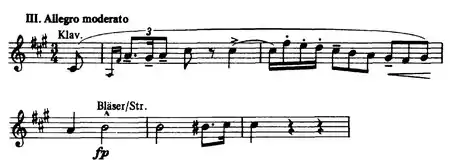Piano Concerto (Scriabin)
The Piano Concerto in F sharp minor, Op. 20, is an early work of the Russian composer Alexander Scriabin (1872–1915). Written in 1896, when he was 24, it was his first work for orchestra and the only concerto he composed. Scriabin completed the concerto in only a few days in the fall of 1896, but did not finish the orchestration until the following May (and only after constant urging by his publisher and patron Mitrofan Belyayev). Belyayev paid the composer 600 rubles (roughly $10,000 in current USD); it premiered in October 1897 and was finally published in 1898.
_1910.jpg.webp)
Klavierkonzert mit Alexander Skrjabin unter Leitung von Sergei Kussewitzky by Robert Sterl (1910), Galerie Neue Meister, Dresden.
Composition
The work consists of three movements, typically lasting about 28 minutes in total:
- Allegro
- The main theme is introduced by the piano and then transferred to the orchestra while the piano accompanies in octaves.

- Andante
- The second movement begins in the key of F-sharp major which was for Scriabin "a ‘bright blue’ mystic key".[1] It is in the form of theme and variations. The orchestra introduces the theme. The piano enters with the first variation, accompanying the orchestra's theme with arpeggios. The second variation is faster, marked allegro scherzando. The third variation is a slow funeral march. The fourth variation is marked allegretto and features intricate ornamentation; the clarinet introduces the melody, and interweaves counterpoint with the soloist. The movement ends with return of the theme to the orchestra, almost identical to the first variation.

- Allegro moderato
- This movement also develops material from the first movement. The first theme is condensed into the first two bars followed by a virtuosic arpeggio.

Recordings
References
- Ates Orga. "Scriabin & Tchaikovsky: Piano Concertos". Hyperion Records. Retrieved 3 December 2014.
External links
- Pianopedia, Alexander Scriabin, Piano Concerto in F-sharp minor
- Piano Concerto (Scriabin): Scores at the International Music Score Library Project
This article is issued from Wikipedia. The text is licensed under Creative Commons - Attribution - Sharealike. Additional terms may apply for the media files.